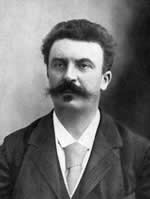Maupassant

Guy de Maupassant was born on this day in 1850 at Chateau de Miromesnil, France.
After fighting in the Franco-Prussian War, Maupassant made ends meet as a government clerk in Paris for about 10 years while harboring a desire to make his living as a writer. He entered into an "apprenticeship" with Gustave Flaubert, an old family friend, submitting everything he wrote to Flaubert's rigorously critical eye. Nearly everything he produced during this period he discarded, until the publication of his short story "Boule de Suif" (1880) a few weeks before Flaubert's death; the story was an overnight sensation.
For ten years after that, Maupassant worked tirelessly, turning out nearly 300 short stories, several novels and three hundred magazine articles. The short story was the medium in which he showed his mastery, however. Among his greatest: "The Necklace" (about a couple who work for 10 years to replace a lost borrowed necklace only to find out that it was a fake); "The Mother of Monsters" (about a woman who deforms her unborn fetuses to be sold as freaks to traveling shows); "A Madman" (about a judge who kills and sends others to death for his crimes); "The Putter-to-Sleep" (about a suicide factory); "The Old Man" (about a family who hold a funeral party for its patriarch -- only he refuses to die until everyone sits down to dinner); "Mother Savage" (about a mother who exacts revenge on the Prussian Army for killing her son by boarding four soldiers and burning her own house down); "Of Doctor Heraclius Gloss" (about a man who believes in reincarnation who is sent to an asylum for treatment, is cured, and then becomes obsessed with killing animals); "The Flayed Hand" (about an Englishman pursued by a severed hand); "Who Knows?" (about a man whose furniture comes to life and escapes his house); and "The Horla" (about an unseen, malevolent presence which produces madness in people).
Ironic and macabre, Maupassant's stories objectively portray humanity's horrors without revealing any moral point of view; for Maupassant, all humans are beasts, and all dreams are meaningless. Already suffering from recurring bouts of syphillis by the time he became a literary star, he suffered from severe migraines and tried fresh-air (on his yacht, the Bel-Ami) and drugs to combat them, to no avail. After the death of his brother in an insane asylum in 1889, he feared for his own sanity and twice attempted suicide. He entered an asylum in January 1892, and died there 18 months later, on July 6, 1893.
An impressive list of filmmakers have based their works on Maupassant's stories, including D.W. Griffith (The Necklace, 1909), Henry King (The Woman Disputed, 1928, with Norma Shearer), Kenji Mizoguchi (Maria no Oyuki, 1935), John Ford (Stagecoach, 1939, based on "Boule de Suif"), Robert Wise (Mademoiselle Fifi, 1944),and Jean-Luc Godard (Masculin feminin, 1966, with Brigitte Bardot), not to mention Diary of a Madman (1963, starring Vincent Price).
Labels: Literature





0 Comments:
Post a Comment
Subscribe to Post Comments [Atom]
<< Home